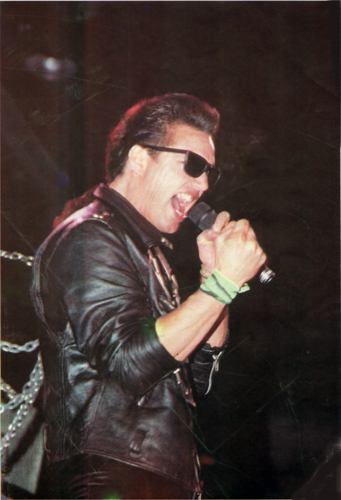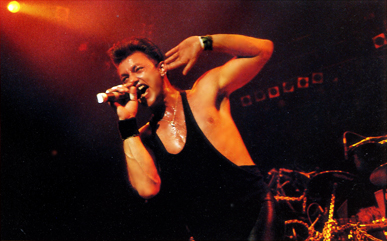
| Search JoyZine with Google Site Search! |
|
Queensryche Interview by Richard Cromelin
After Mindcrime gradually introduced the Seattle-based quintet to a large audience in 1989, its 1990 follow-up Empire was an immediate hit and has sold more than 2 million copies to date. As Queensryche nears the end of its first arena headlining tour, the momentum continues. In a depressed concert market, and more than a year after Empire came out, the band quickly sold out its shows. High-tech, operatic and unfashionably complex in a back-to-basics era, faceless in an age that enshrines faces, Queensryche are furrowed-brow moralists crashing the hedonistic hard-rock party. They avoid sexism in their videos and they take punk bands on the road as their opening acts. Under the metal umbrella, they're about as far as you can get from the high-profile sideshow of a Guns N' Roses. "Well, I think it's just a different approach," offers Queensryche guitarist Chris DeGarmo. "They are a very visible band in all respects. They seem to be very intent on being in the eye of the storm at all times. They've cultivated a very reckless image for themselves, and I think it's done well for them. But everybody has a different way of going about it. I think we are a little more of an invisible entity. You know, we're away from it, we live up in Seattle where we're not really in the public eye except through our music and the videos, and whatever events happen in our lives don't make it into the news.
"I don't know whether that will prove to be good for us or bad for us, and I don't really care as long as people appreciate our music. We spend so much time giving to the public anyway, I'm really not all that keen on anteing up my private life. I think it's one aspect that we all hold on to in a very cherished sort of way, that little bit of privateness." DeGarmo, 28, sounds a little more exasperated the more he thinks about it. "Just because our band hasn't been in and out of detox.... I mean look, everyone was young, everyone has gone through their things, it's part of growing up. It's just that we haven't chosen to push that as some sort of addendum to selling records." Queensryche—DeGarmo, singer Geoff Tate, guitarist Michael Wilton, bassist Eddie Jackson and drummer Scott Rockenfield—formed in the Seattle suburb of Bellevue in the early '80s, and in 1983 released a four-song demo that quickly led to a contract with EMI Records. The band's fast rise and its air of confidence were evident early. Jonathan Poneman, co-owner of Seattle's underground Sub Pop Records, was working the backstage door at Seattle's Paramount Theatre at one of Queensryche's first shows, an opening spot for metal wailer Ronnie James Dio. Said Poneman, "What I remember about it is that there were a lot of girlfriends backstage. This band already had an entourage. There was a real feeling that they were having a victory party before the game was even played." The same traits have made Queensryche the target of barbs, such as the scathing assessment by Village Voice critic Robert Christgau in his book Christgau's Record Guide: the '80s. "These five [musicians] from an affluent Seattle suburb... [are] into selling," Christgau observed. "They woodshedded for two years, avoiding the seamy bar circuit in their pursuit of the rock'n'roll dream, which is of course a big contract. And when they got it they gave two weeks' notice on their day jobs like the second-generation managers they are."
DeGarmo, a thoughtful and soft-spoken type, sounds more pained than angered by the broadside. "The only calculation that went into our band, just as any band, was trying to find musicians that relate to one another and a certain caliber of musicianship," he responds. "I find that a little difficult to sit with considering that it's taken us 10 years to reach this position. Calculating? We started off with an initial management team that owned a mom and pop record store that just believed in the band. That's a pretty grass-roots beginning, really. "As for confidence, I think to do anything these days you've really got to have some sort of faith in yourself.... In any career you choose, you really need to have some confidence on your side." Even Sub Pop's Poneman, patron of a more unpolished, street-level brand of rock, senses something different in Queensryche's metal. "I personally have a lot of respect for them, because even though they play an entirely different kind of music, they're really iconoclastic for what they do." Gregg Steele, program director at L.A. hard-rock radio station KNAC-FM, likens Queensryche's music and career to those of a progressive precursor. "It's similar to the way Rush progressed," said Steele. "They're a thinking man's hard-rock band—and they started as a cult group and grew in popularity. But Rush has an older audience now. They don't speak to 17-year-olds the way Queensryche does. "I believe their fans are fanatical about them. They pore over the lyrics. They feel more of a bond than with most hard-rock bands. It's more than just a hard-rock band. There's some spiritual bonding going on." |

